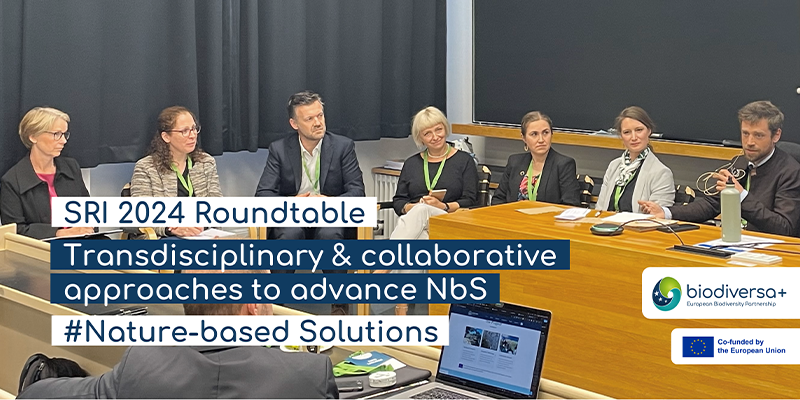Biodiversa+ recently participated in a roundtable discussion at the SRI Congress in Helsinki, highlighting the importance of Nature-based Solutions (NbS) for achieving sustainability goals like the EU Biodiversity Strategy, the EU Climate Law, and the EU Climate Adaptation Strategy.
The session, titled “Horizon Europe Partnerships’ Dialogue: Nature-based Solutions for Urban, Water and Marine Ecosystems and Biodiversity,” brought together Biodiversa+ with three other partnerships: Water4All, Sustainable Blue Economy Partnership, and Driving Urban Transitions (DUT).
Highlighting the Power of NbS
The conversation acknowledged past resistance to integrating biodiversity into policy. However, a broader understanding of the interconnectedness of crises such as biodiversity loss and climate change now underlines the need to integrate biodiversity into a range of policy areas. This new perspective offers an opportunity to leverage the potential of NbS and their multi-faceted benefits across health, climate, pollution, and agriculture.
In this respect, Biodiversa+ called for transdisciplinary approaches and continuous Research and Innovation (R&I). For instance, as a NetworkNature partner, Biodiversa+ co-developed the European NbS R&I Roadmap to 2030, identifying trends and knowledge gaps in EU-funded projects. Biodiversa+ also conducted desk studies on biodiversity’s role in NbS design and delivery, and on the link to transformative change (to be published in July 2024).
A key point raised was the need to address the values and uses associated with NbS for effective governance and maximising their potential. The session acknowledged the context-specific nature of these benefits, highlighting the need for thorough evaluation.
Collaboration and action
The session underscored the importance of collaboration between initiatives and European Partnerships. Complementary approaches and collaborative project clustering were highlighted as successful strategies. Furthermore, discussions explored additional pathways for cooperation, such as Knowledge Hubs and Living Labs.
The roundtable also featured sectoral perspectives from three NbS projects: Living Port (bio-enhanced concrete in coastal and marine infrastructure), Nature-wise Espoo (“no net loss” urban development), and ATeNaS (integrating water management and ecosystem services). These presentations showcased successful NbS implementations, underscoring the need for stronger policy support for NbS and recognition of biodiversity’s role in climate resilience. Additionally, discussions emphasised the importance of data infrastructure for effective NbS implementation and monitoring, as well as the need for more best practice examples and knowledge sharing.
Looking Ahead
Reflecting Biodiversa+’s commitment to NbS, a research call was announced in September 2023, focusing on understanding tipping points, trade-offs, and mechanisms affecting NbS implementation. The call is now closed, and projects will begin from the end of this year. More recently, the launch of a new call has been scheduled for September. This call focuses on transformative change for sustainable biodiversity management, with Nature-based Solutions (NbS) to play a pivotal role in driving this transformation!



